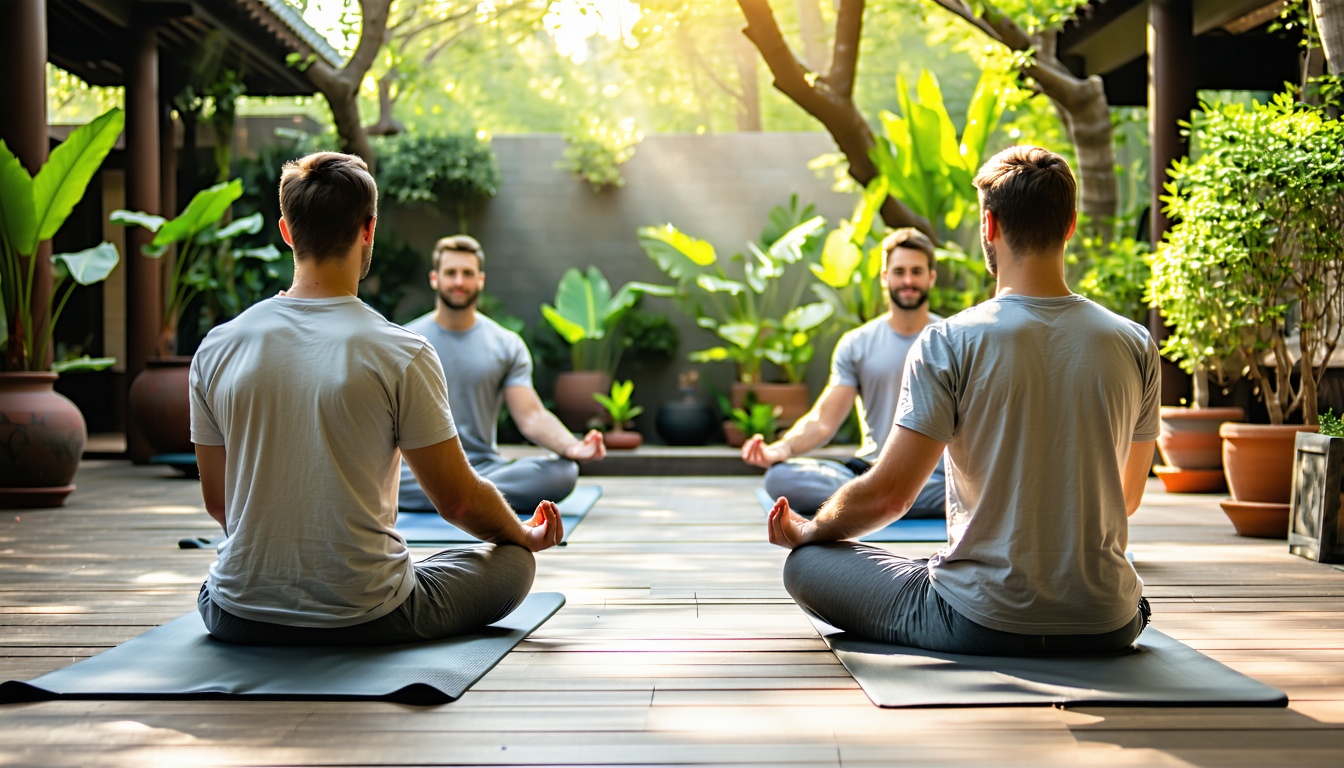Explore yoga therapy fundamentals
If you are looking for a yoga therapy residential program that addresses your unique challenges in overcoming drug or alcohol addiction, you may find yourself seeking an approach that balances physical, mental, and emotional well-being. Yoga therapy weaves together movement (asanas), meditation, breathwork, and relaxation techniques to empower you in your recovery. By integrating these practices in a residential setting, you can forge healthier coping mechanisms, deepen your sense of self-awareness, and build a foundation for lasting sobriety.
What is yoga therapy
Yoga therapy goes beyond the traditional yoga class that you might attend at a local gym or studio. This specialized field emphasizes the therapeutic potential of yoga, adapting its elements to address specific health concerns. Certified yoga therapists personalize each session to match an individual’s goals—such as relieving chronic pain, reducing stress, or working through emotional trauma. They consider your medical history, physical constraints, and emotional needs, ultimately creating a practice plan that supports your healing process.
According to Cleveland Clinic, yoga therapy often incorporates gentle stretches, mindful breathing, meditation, and guided relaxation. This multifaceted approach helps you cultivate mental clarity, reduce anxiety, and ease physical tension. For instance, diaphragmatic breathing can lower cortisol levels, a stress hormone, which may help your body relax and support mental health stability. This stress relief can play a significant role in addiction recovery, particularly when you face triggers and cravings that spark unwanted impulses.
Origins and modern practice
Yoga as a holistic healing art traces its roots back thousands of years in India. However, the specific term “yoga therapy” was popularized in the 20th century, pioneered by medical professionals and yogic scholars who recognized yoga’s power to heal beyond the scope of standard exercise. Modern yoga therapy seeks evidence-based approaches, bridging Western medical knowledge with Eastern traditions of holistic wellness. Institutions like The Minded Institute and beYogi highlight yoga therapy’s potential to address everything from musculoskeletal pain to mental health conditions.
Today, yoga therapists receive specialized certification—often exceeding 800 hours of training—that covers anatomy, physiology, psychology, and yoga philosophy. This rigorous preparation enables certified professionals to adapt practices specifically to your needs, whether you’re healing from an injury, dealing with anxiety, or navigating the complexities of addiction recovery.
See why residential matters
One of the most compelling ways to maximize the benefits of yoga therapy is by attending a residential program. Unlike outpatient clinics or standalone yoga sessions, a residential environment offers you the opportunity to immerse yourself fully in a structured routine of therapies, support groups, and healthy living practices.
In-depth focus on recovery
When you reside at a treatment facility, you can focus on recovery without the daily distractions of work, social obligations, or chaotic home environments. This immersive atmosphere fosters introspection and personal growth. If you choose a men-only rehab program, you also benefit from connections with peers whose experiences may mirror your own, offering a sense of brotherhood and empathy that overcomes any fear of judgment.
Spending extended time in a structured setting allows for deeper exploration of root causes of addiction. You not only practice yoga therapy but also have access to complementary programs, such as trauma informed therapy, psychiatric support therapy, or life skills training therapy. These additional resources can be instrumental in helping you identify triggers, process unresolved trauma, and develop coping mechanisms.
Time to establish healthy habits
Recovery is a journey of rebuilding the body, mind, and spirit. Typically, it takes time to unlearn old habits and solidify new ones. Research from Legends Recovery suggests that residential stays of at least 60 to 90 days often yield significantly better long-term outcomes compared to shorter programs. This time frame gives you an opportunity to tune into a consistent rhythm of yoga therapy sessions, group therapy, nutritional planning, and other beneficial routines that strengthen your resilience.
Within a residential setting, your days can include scheduled yoga practice, daily group check-ins, and time for reflection or journaling. Over the course of weeks or months, these structured routines transform into daily habits that become increasingly natural. This consistent engagement with positive, mindful practices can prove especially important upon returning to regular life, where stressors and temptations might otherwise derail your hard-earned progress.
Address men’s unique challenges
Men’s addiction recovery often involves a distinct set of barriers, including ingrained ideas about masculinity, cultural expectations of stoicism, and the reluctance to show vulnerability. By entering a specialized residential treatment geared toward men, you can tackle these unique hurdles in a supportive setting that emphasizes camaraderie and shared growth.
Breaking societal expectations
Many men struggling with substance use disorders have learned to suppress difficult emotions like fear, shame, or sadness. These feelings can accumulate over time, leading to increased reliance on substances as a coping strategy. A men-focused residential program encourages open discussions about these patterns, dismantling the notion that expressing emotion is a weakness. Yoga therapy facilitates this process by allowing you to explore emotions through mindful movement and breath, tapping into sensations that might be easier to express physically rather than verbally.
As part of creating a more open mindset, you might also explore specialized sessions on trauma group therapy or men’s mental health counseling. These approaches complement yoga therapy by providing a safe forum to articulate your struggles. Together, these methods affirm that it is valid to feel, to share, and to need support—critical components for building a meaningful recovery.
Forming supportive connections
A significant benefit of men-only programs is the sense of brotherhood that develops. When each participant faces similar gender-specific pressures, the common ground makes group discussions and trust-building far more straightforward. Yoga therapy sessions, especially when conducted in small groups, naturally foster bonding as participants engage in shared movements and group meditations.
These sessions can extend into other communal therapy styles like group therapy, family therapy, or peer support alumni. Each of these offerings can deepen your sense of connection. By bonding in a gender-specific environment, you can celebrate collective successes and learn from each other’s setbacks. Over time, this atmosphere contributes to sustaining your motivation, reminding you that you are not alone on this path.
Learn core benefits
Yoga therapy offers a multifaceted toolkit that addresses both physical and emotional well-being. Among its many advantages, two stand out for men navigating drug and alcohol rehabilitation: physical restoration and emotional resilience. When woven into a residential program, these benefits can reinforce each other, helping you reclaim ownership of your life.
Physical restoration
Substance use disorders can strain your body, leading to nutritional deficiencies, lack of exercise, and erratic sleep patterns. Incorporating restorative yoga poses improves circulation, eases tension in tight muscles, and can help reset normal sleep rhythms. Research from Promises shows that yoga therapy may lower blood pressure, strengthen immunity, and reduce pain. These physical improvements help you feel steadier as you undergo detox, stabilize your mood, and manage withdrawal symptoms.
You might also opt for a complementary approach like holistic therapy, nutrition support rehab, or structured outdoor fitness to amplify the bodily gains of yoga. By strengthening both your physical self and your awareness of the body’s signals, you gradually become more mindful about taking care of your health—an integral part of sobriety.
Emotional strength
Beyond physical benefits, yoga therapy profoundly influences mental and emotional health. Carefully guided breathwork reduces tension and can de-escalate episodes of anger or anxiety. Many men in recovery discover that controlled breathing techniques act as an emotional anchor—when stress levels spike, you can center yourself by returning to mindful inhalations and exhalations.
Meditation and introspective exercises encourage you to notice underlying thought patterns, recognize triggers, and respond more calmly to daily challenges. This higher level of emotional awareness paves the way for improved communication in relationships and greater resilience in stressful situations. The empathy and acceptance you learn in meditative states can also deepen your understanding of your own vulnerability, diminishing the instinct to numb painful emotions with substances.
Choose Recovery Bay Center
If you or a loved one is seeking men’s drug and alcohol detox and rehab services, Recovery Bay Center provides a specialized setting that integrates yoga therapy into a broader framework of proven treatment modalities. A yoga therapy residential program at Recovery Bay Center emphasizes evidence-based strategies, one-on-one support, and a gently structured environment that fosters healing from the inside out.
Tailored approaches for you
No two people share the same recovery path, which is why customization is central to the program at Recovery Bay Center. Depending on your physical and mental health background, you may pair yoga therapy with individual therapy, stress management therapy, or dual diagnosis therapy if mental health concerns intersect with addiction. If you are grappling with deep-seated trauma, emdr trauma therapy or trauma informed therapy can be integrated into your plan to support your progress.
Furthermore, to maintain continuity through different stages of recovery, the center offers telehealth case management in some cases. This resource allows you to stay connected with professional therapists, even after your residential program. Equally important, staff members can help you map out aftercare strategies, guiding you to outpatient step down care, sober living referral, or employment assistance rehab, depending on your personal needs.
Comprehensive support system
Recovery Bay Center’s staff consists of professionals dedicated to your comfort, safety, and well-being. Whether you are undergoing detox or adjusting to a new yoga routine, continuous medical supervision ensures that any complications or side effects are addressed promptly. Therapists and counselors remain available to discuss concerns, celebrate milestones, and keep you motivated.
You can access a variety of supportive therapies, from on site medical care to meditation therapy residential sessions. The center’s environment promotes mutual encouragement—fellow residents and staff members share a commitment to one another’s progress. Ultimately, this cohesive network addresses your daily challenges, providing a solid safety net as you adapt to your new lifestyle.
Consider treatment timelines
The length of your residential stay can make a difference in how deeply you internalize key coping techniques and healthy habits. While 30 days of rehab may be sufficient for stabilization in more moderate cases, evidence continues to point toward the effectiveness of longer programs in building a robust defense against relapse.
30 days to 90 days
Some men find that 30-day programs help them get their lives back on track. In these shorter stints, you can address urgent matters such as detox, immediate counseling, and introducing yoga therapy or mindfulness practices. It can serve as a starting point, letting you see how your body and mind respond to a it.
Yet, many individuals do better when they extend their stay to 60 or 90 days. During this extra time, you can delve more deeply into any unresolved emotional traumas, refine coping strategies, and establish meaningful relationships with peers and mentors. Longer residential treatment fosters the self-awareness and confidence integral to resisting cravings and managing triggers once you return home.
Longer stays, stronger foundations
When you choose to remain in a supportive environment for a lengthier period, you allow yourself the time and space to learn, practice, and truly integrate new behaviors. This approach is particularly valuable if you have completed multiple short programs in the past but relapsed afterward. Longer-term options create a more durable change in lifestyle—one that can stand up to everyday stressors, social pressures, and the lingering psychological hold of addiction.
According to Pyramid Healthcare Blog, living in a residential facility for at least several weeks helps build new neural pathways for healthier coping mechanisms. By steadily reinforcing the lessons of yoga therapy and complementary treatments, you strengthen your body, sharpen your mind, and fortify your emotional well-being. Placing yourself in a stable, consistent environment reduces the chance of encountering avoidable setbacks, giving you the best possible start to a sober life.
Frequently asked questions
Below are five questions that many people have about yoga therapy in a residential rehab setting. These answers can help clarify how a yoga therapy residential option might fit into your own journey, especially if you are considering the comprehensive services at Recovery Bay Center.
What makes yoga therapy different from a regular yoga class
Yoga therapy is a specialized branch of yoga focused on healing and recovery, rather than general fitness or recreation. Certified yoga therapists undergo extensive additional training, often up to 800 hours or more, covering anatomy, physiology, psychotherapy fundamentals, and yoga philosophy. This expertise enables them to tailor each session to address specific conditions, including substance use disorders or co-occurring mental health issues. It’s an individualized approach, often done in small groups or one-on-one sessions, making it distinctly different from a larger, more casual yoga class.
How long do I need to stay at a yoga therapy residential program
The ideal length varies based on your background, the severity of your addiction, and your overall health. Some individuals thrive with a 30-day immersion, while others benefit from 60 or 90 days, or even more. Longer stays generally allow deeper personal growth, greater consistency in learning new habits, and stronger defenses against relapse. It’s best to discuss your specific case with professional staff at Recovery Bay Center to decide on a timeline that appropriately meets your needs.
Is yoga therapy suitable for severe addiction or co-occurring disorders
Yes, yoga therapy is frequently integrated into a broader treatment plan that can address severe addiction, co-occurring mental health concerns, or trauma. Techniques like mindfulness meditation, guided relaxation, and gentle stretches support emotional balance, particularly when combined with dual diagnosis therapy, medication-assisted treatments, and regular counseling. If your addiction is severe, these customized therapies can help regulate stress and improve self-awareness at each stage of recovery.
What if I’m not flexible or have physical limitations
Yoga therapy accommodates a wide range of physical abilities. A therapist will select poses and techniques that match your comfort level and physical condition, ensuring you stay safe. According to Cleveland Clinic, therapists adhere to the principle of “do no harm,” modifying stretches or poses to reduce risk of injury. Whether you can only sit in a chair or you’re accustomed to high-intensity workouts, you can participate and experience the benefits.
Can I combine yoga therapy with other treatment methods
Absolutely. Yoga therapy typically serves as one aspect of a comprehensive plan for men’s rehab. Programs such as family therapy, group therapy, suboxone treatment rehab, or 24 7 nursing care often work in tandem, reinforcing each other. At Recovery Bay Center, you can further enhance your recovery with complementary therapies like mens holistic wellness, ensuring that your mental, physical, and emotional dimensions are cared for in harmony.
By understanding how yoga therapy fits into a men’s addiction treatment environment, you can make a more informed decision about your path forward. Whether you stay for 30 days or 90, the process of melding physical, mental, and emotional wellness can reawaken your inner strengths. Recovery Bay Center strives to provide the resources you need—ranging from yoga therapy to evidence-based medical interventions—so that you can emerge healthier, stronger, and more prepared to face life’s challenges without the crutch of substance use.
Embarking on a yoga therapy residential program is a positive step, especially when you or a loved one is ready to break free from the cycle of addiction. By approaching health holistically and engaging in proven therapeutic modalities, you can discover renewed confidence, stable sobriety, and a long-lasting sense of well-being. Recovery Bay Center is here to guide you every step of the way, offering the comprehensive care you deserve on your journey to reclaim your life.





